Six remarkable stories from UU students and staff
2023, a year of startling discoveries, maddening joy, and intense sadness
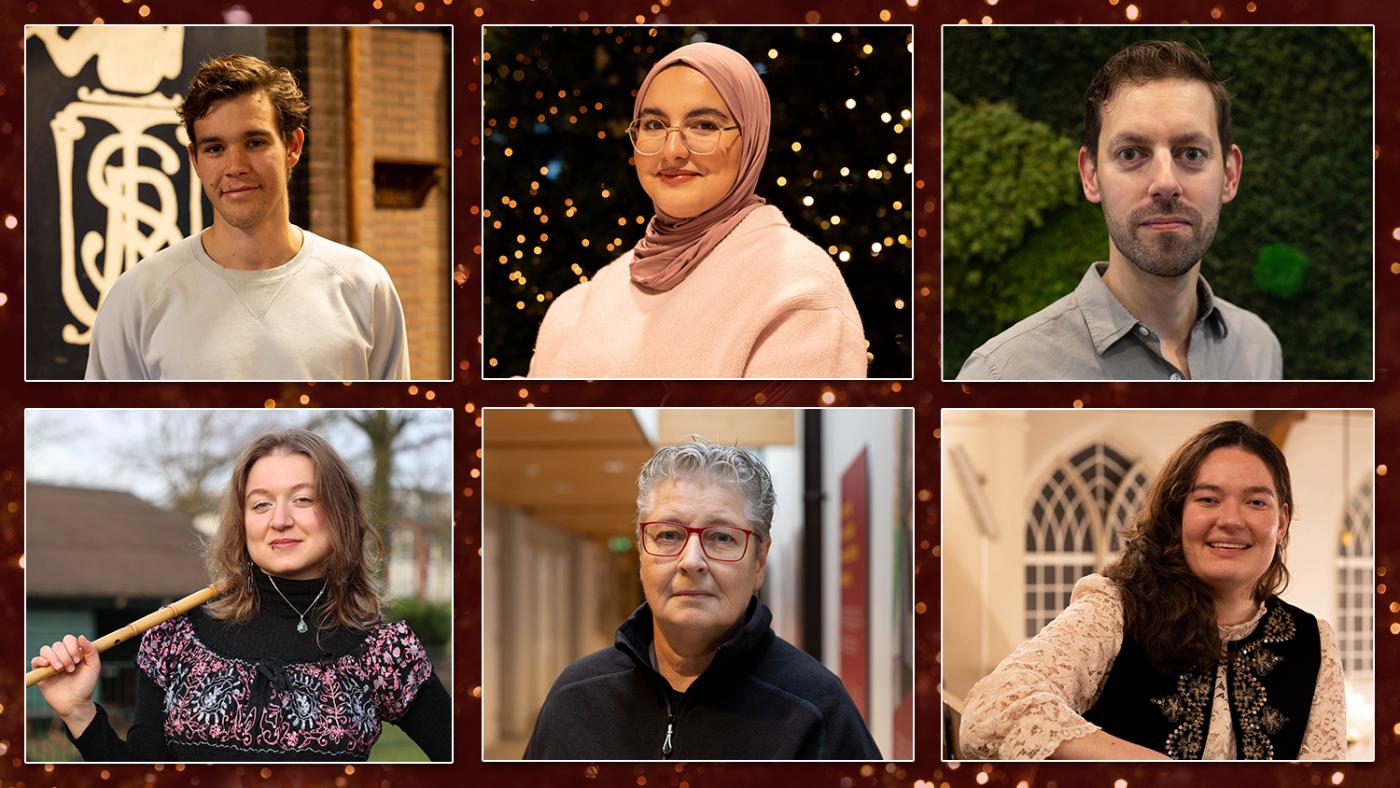
Mariam Ikassrien met queen Máxima three times
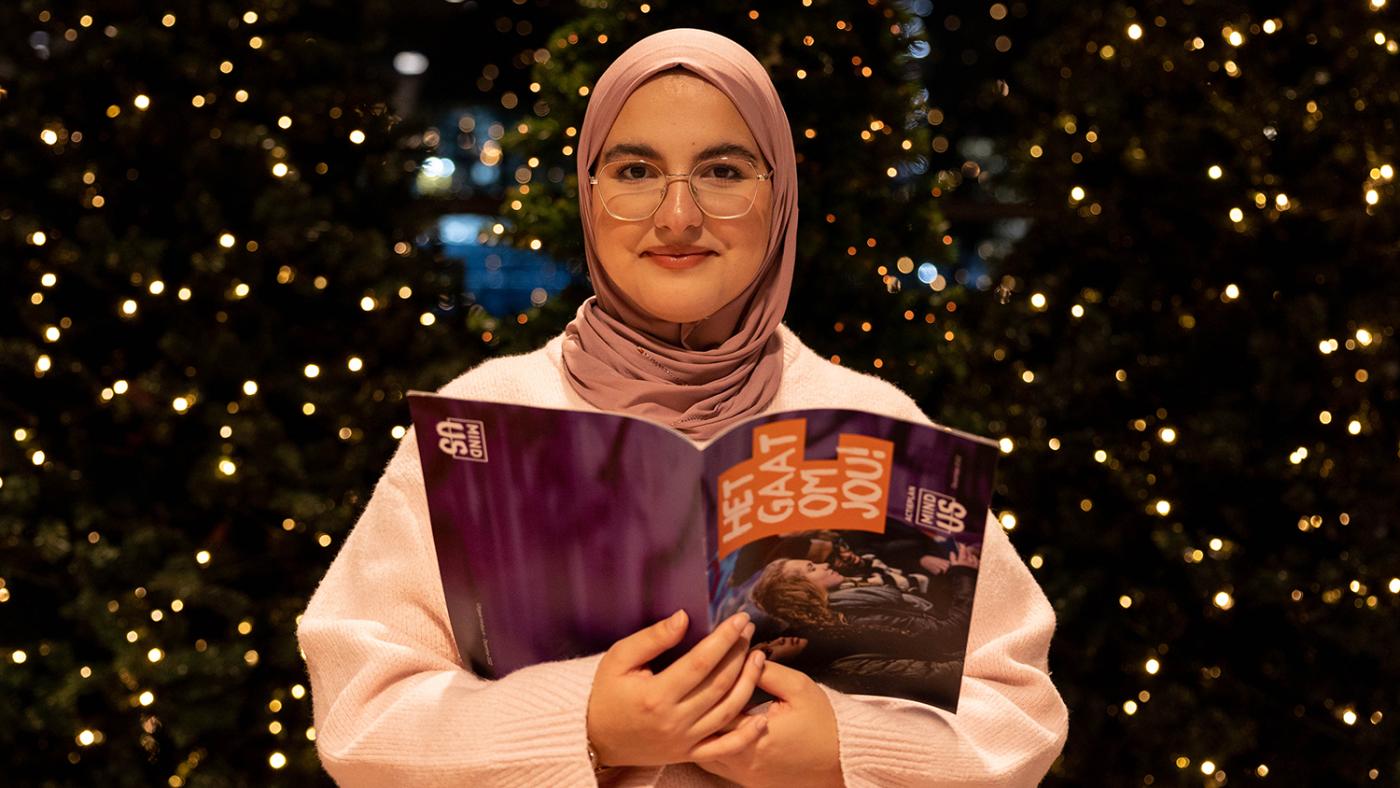
‘It is so important to pay attention to mental health’
"When you talk to Máxima, you don't feel like you’re talking to a queen. She really engages with you, she is interested in what you have to say. I met her on several occasions this year. Once at Noordeinde Palace, once at her home in Wassenaar, and once in September, at UNLimited University Festival.
I am affiliated with Mind Us, a foundation dedicated to young people's mental health, of which Máxima is the honorary president. I am one of the members of the Directive Council, a kind of advisory board in which young people contribute ideas to improve the mental health of youth in the Netherlands.
Attending a meeting at Villa Eikenhorst, the queen’s official residence, was very special. Being in the palace was such a cool experience. There was even someone to take your coat and carry your bag. If you’re not used to such treatment, it feels a bit awkward.
At the university festival, Máxima also spoke to a group of students, but I couldn't participate because that talk was mostly about student associations. But I was able to tell my story during a debate later that day. I was onstage with a few other students from Mind Us, alongside the Minister of Education, Robbert Dijkgraaf, and the rector of the University of Amsterdam, Peter-Paul Verbeek.
I told them about how I got into university and how the university is helping me succeed despite my mental health issues. I am from Morocco and I came to the Netherlands when I was 13 years old. My parents had no idea how the Dutch education system worked. After a few months, I had to take the so-called Cito Test (an independent assessment of final-year primary school pupils, Ed.) and I ended up at a basic vocational school. I already knew back then that I wanted to go to university, but they looked at me funny when I said it.
With some help, I was able to make some strides fairly quickly, which allowed me to go to a higher level of vocational education and then follow it with the pre-university school. I developed mental health issues during pre-uni and I have suffered from chronic depression ever since. I was able to graduate even though exams stress me out immensely. That allowed me to finally go to university, but I also went to therapy."
I chose to study Educational Sciences because I want to help people. I was allowed to study part-time due to my mental health issues. Thanks to my study adviser, I also got other kinds of assistance, such as being allowed to take exams in a separate room and sign out without having to explain myself over and over again. Everything is so well organised, although I have noticed that students without a diagnosis are much less likely to get such help."
Since I find mental health so important, I was also active in the youth panel of the Netherlands Youth Institute and I participated in the Hey, it's okay campaign of the Ministry of Health, Wellbeing and Sport. I want to share my experiences and let young people know that it’s okay to ask for help."
Higher vocational education or pre-uni?
"I made it through higher vocational pretty easily, I didn't get mental health issues until pre-uni. Still, I'd go for pre-uni because the pressure to perform helped me get to where I am today."
A monarch or a president?
"I would choose a president. Monarchies are outdated, and that goes for both the Netherlands and Morocco."
Lawyer or educator?
"I used to want to be a lawyer, but now I think lawyers focus too much on the law. Educators are more attentive to social problems when it comes to drawing up policy."
Celine Oldenhage discovered a seventeenth-century painting
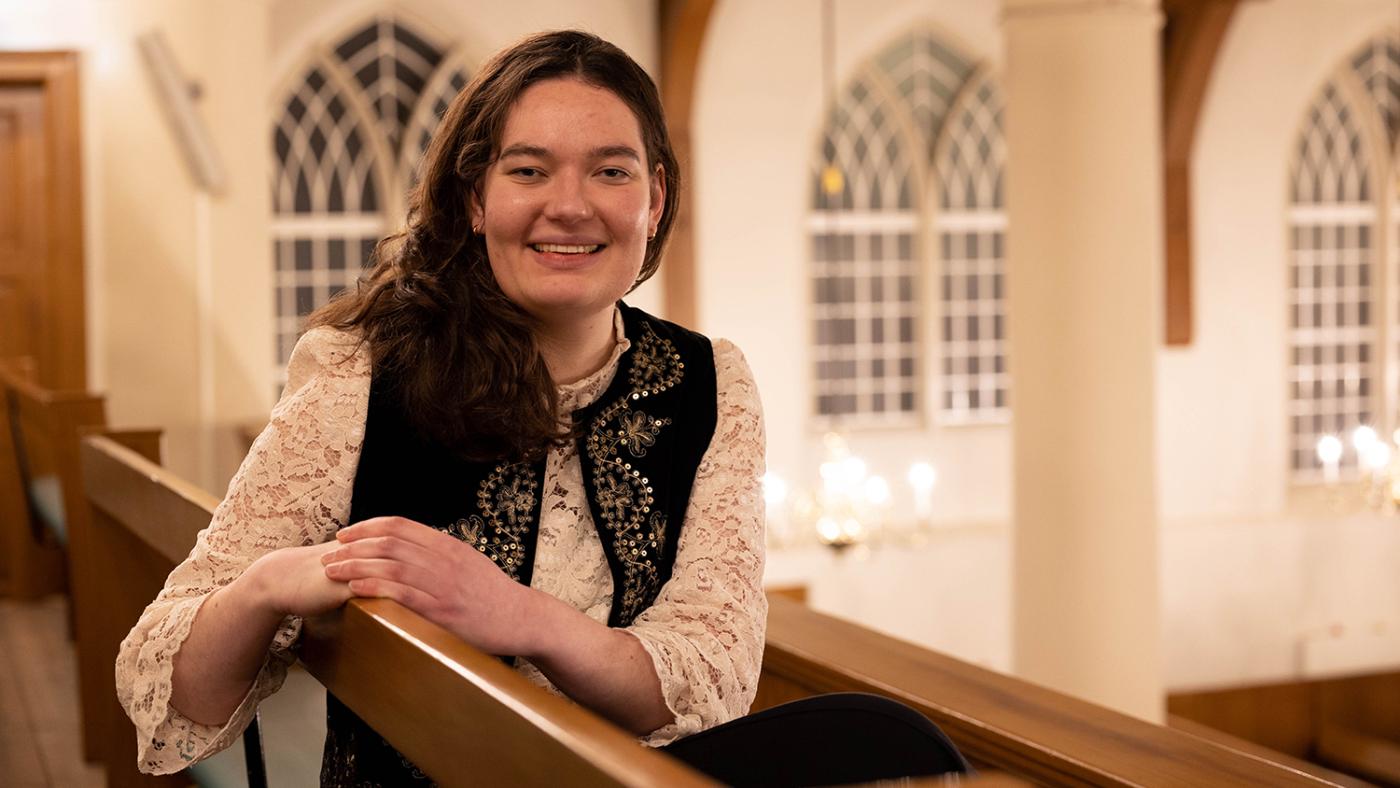
‘We looked at each other and said: "This is the real deal"'
"After doing an internship at Walloon Church in Amsterdam, I was asked to further research the vast amount of religious heritage the church has, such as its plates, furniture, and silverware, as well as its painting collection. I was scouring the archives day in and day out. One day, I stumbled upon a newspaper article from 1932.
A conservator wrote that, while cleaning the 1641 painting The Regents of the Walloon Orphanage, he found the signature of seventeenth-century painter Bartholomeus van der Helst under layers of old overpainting. I initially thought it was a mistake on his part. Very silly of me, but I clicked the article away and paid no more attention to it.
Still, in the back of my mind, I was wondering if it could be true after all. So, I delved further into the archives, where I eventually found more 'evidence’, such as restoration notes and minutes confirming that the signature was found in 1932. More and more, it dawned on me that it really was a forgotten Van der Helst. To be honest, I wasn’t sure what to do next. I even googled what to do when you rediscover a painting.
Besides, I was busy finishing my pre-Master's degree in Cultural History, so I just left it as it was until the last day before the summer holidays, when I thought: ‘Dammit, I'm not going to leave that Van der Helst for someone else to rediscover.’ That's when I called a church councillor, quite impulsively, and told him.
After that call, things happened pretty fast. We went to the depot to remove the fame, alongside the curator of the Amsterdam Museum and a few members of the church council. Traces of a signature were visible, albeit very faintly. A conservator then came in to clean the corner of the painting. I was a bit nervous, though. You have to look very closely, using bright light, to get a good focus. It became clearer and clearer with each minute until we gradually saw the outlines of a 'B' and 'Helst' appear. At that point, we all looked at each other and thought: ‘This is the real deal!’ That was an amazing moment.
After the discovery, I wrote an article about it for Amstelodamum, which was published early this year. I honestly didn't expect the media to jump on the story the way they did. I was just drinking my morning coffee when I realised I was on the news. Phone calls and e-mails began pouring in and I was on the Dutch radio that same evening. In the following days, several journalists called me for interviews or stopped by the church. It was surreal."
Art history or cultural history?
"Cultural history because it focuses on understanding how people lived. While studying gravestones, I delved into three hundred years' worth of records belonging to grave makers and church masters. Occasionally, I encountered personal notes or unearthed pieces that had never been seen or read by anyone before.
Visiting a museum or working for a museum?
"Nothing beats working in a museum. The most beautiful pieces can be found in the depot and you can hold them and touch them. As a visitor, you only see a small selection."
What are you looking forward to in 2024: graduating or starting a PhD programme (if accepted)?
"Doing a PhD. I can't wait to start researching again. I still visited the church often after completing my thesis. When I look at the tombstones, it feels like they are waiting for me to examine them."
Eli Brouwer won this year's Varsity
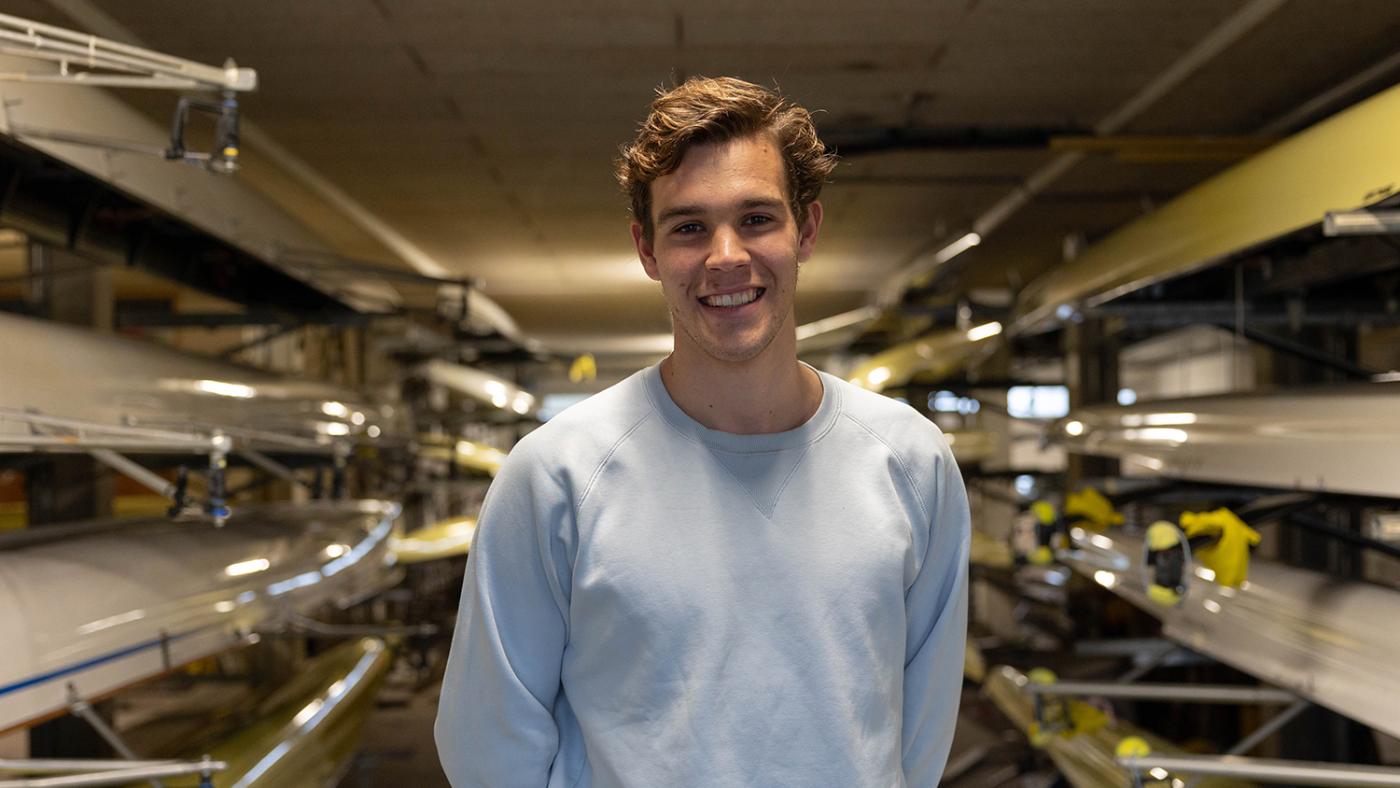
'At the Railway Museum, I could see the remnants of our victory wreaths'
"From the moment you join Triton, you learn that winning Varsity is the biggest thing you can achieve as a rower. It's a student competition and the level is not always that of the best but, all year round, everyone in the association talks about how important it is.
We were driven by carriages from the Railway Museum to the pub crawl on Janskerkhof, an age-old tradition in Utrecht. For the Triton members, this means you are the bee’s knees but USC or UVSV members have no idea what it is. They just think: ‘Great party, who are you?’. That pulls you back down pretty quickly and it makes you realise that your hero status is short-lived. On the other hand, days later, I could still see the leaves that had fallen from our victory wreath at the Railway Museum. That was a beautiful sight.
"To me, this victory represents a team spirit. Two of the other three men who were on the boat with me are roommates of mine and the four of us worked really hard for this achievement. I can vividly recall the moment we took over the lead, 1,200 metres into the race. That's when we knew victory was within our grasp.
Apart from Varsity, 2023 had been a great rowing year for me anyway. Together with my Triton clubmate Pieter van Veen, I won the student world championship in China, as well as the Dutch championships, and we made it to the A-finals of the World Cup in Varese.
Since this autumn, I’ve been part of the Dutch national rowing team, which means I train at Bosbaan, in Amstelveen, now. The goal is to qualify for the Paris Olympics, maybe together with Pieter in the Coxless pair event. I'm going all-in for that.
How that is going to impact my studies? I don't know yet. I’m following a Master's programme in Bioinformatics & Biocomplexity and, so far, I’ve managed to keep up with the programme quite well but perhaps I will prioritise rowing for a while now."
Bosbaan or Merwede canal?
"The Merwede canal has more sentimental value to me, as you can imagine. It's not perfect for rowing but I could always get by just fine on my own in the skiff. For now, I choose Bosbaan and training with the Dutch national team there."
Competing in the Olympics or winning Varsity?
"That's a very tricky one. Would that mean I'd have to hand in my tin medal? My girlfriend wouldn't like that. It’s customary for winners to give their tin medals to their girlfriends who then turn them into necklaces. But, if I really had to choose, I think I'd still go for the Olympics."
Being together with your clubmate Pieter van Veen on the boat or in the pub?
"Ah, this one's easier. On the boat. Pieter isn’t much of a party animal."
Caroline Gremmen had to leave UU due to long Covid

‘My life has become totally different’
"I was working as a receptionist at the Faculty of Social Sciences, on Langeveld, when Covid-19 broke out in 2020. We were still working on-site during the lockdown.
I got Covid at the end of November 2021. I was the last one of my family to catch it. Our youngest was the first one to come home sick, his entire class had Covid. Then, our eldest got ill, and then my wife. After a week and a half, they all recovered, but I kept getting sicker and sicker, even though I had been vaccinated.
In the middle of December, the doctor sent me to the hospital. I was so tired. Seriously, I was utterly exhausted. I had no strength left in my body. I was allowed to go home right before New Year's Eve. They put a hospital bed in my living room and that thing stood there for a year. I hated it. I had to do physiotherapy to get my legs working, I basically had to learn how to walk again. My whole body was aching and I was suffering from headaches and brain fog. I got overstimulated easily and then my brain would switch off. I also underwent hyperbaric oxygen therapy every day for ten weeks but that didn't bring the desired results either.
At the beginning of 2022, the company doctor suggested I return to work. I really wanted to work again. I was eager to get better, go back to work, walk the dog, go out with the boys, and do chores. I just wanted my life back.
I couldn't work at the reception desk yet because there would be too many stimuli. I was given administrative work at first, but I couldn't concentrate. So, I was tasked with doing rounds in the buildings to check what needed to be repaired. I got exhausted after half an hour. Little by little, I built it up to six hours a week but I ended up crossing my limits and suffering a setback.
It’s been two years now and I can't work anymore. Simple chores like changing the bed sheets and doing laundry take me a whole day. Every morning, it’s a matter of waiting to see how much energy I'll have and what symptoms I'll wake up with. The doctors don't know how to help me. This is hard for my family as well. They had to adapt and get used to the situation.
I know I’m not the only one. Half a million people have long Covid and no one knows if there’s any chance of recovery. I’m in an app group with sixty people who have also undergone oxygen therapy, and we talk about the progression of our disease, therapies, and the latest research, such as the one conducted at UU.
After two years of being ill, I'm done. For over twenty years, I enjoyed working at the university, and my final years were dedicated to the Faculty of Social Sciences, where the atmosphere is great. It may be a cliché, but they are very social people. This was not the farewell I'd imagined. I would have loved to continue working there until my retirement."
Cold or heat?
"Heat. I'm always cold now, chilled to the bone. It's a weird kind of coldness that comes from within."
Dog or cat?
"Dog. I’ve always been a dog person. They are the most loyal buddies and they love you unconditionally. When my bed was in the living room, our dog always sat on it with me."
Reading or watching TV?
“Both are tiresome because it's hard to stay focused. I get overstimulated pretty quickly. But if I had to pick one, I'd say watching TV because it is something I can do with my family and I can just close my eyes if I get tired."
Earth Scientist Eldert Advokaat discovered a lost continent
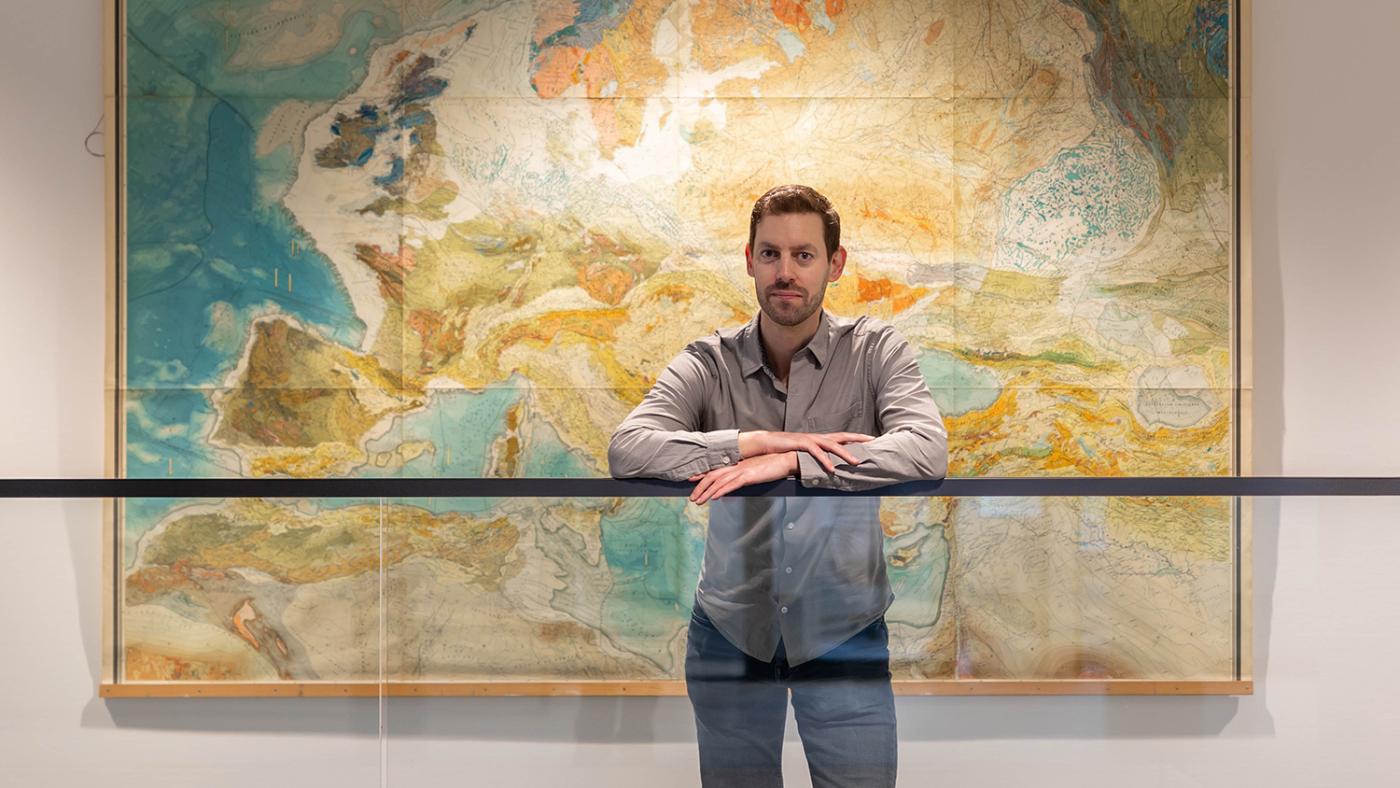
‘We will now reap the benefits of my reconstruction of Argoland’
"About 155 million years ago, a piece of continent broke off on the northwest coast of Australia. For a long time, scientists didn’t know where Argoland, as the lost continent had been called, was located. After seven years of research, my co-author Douwe van Hinsbergen and I found out that Argoland is hidden - in fragments - underneath a jungle that covers a large part of Indonesia and Myanmar.
I never worked on the research full-time, but I was always given a lot of space to work on the project, so I kept doing that after there was no more funding. I just enjoyed it so much. There were a few moments when I thought: 'Gosh, this research is taking so long, am I ever going to finish it?’ But I didn't give myself a deadline. I just took my time and continued working on it diligently.
It’s quite a relief to finally publish the article on Argoland. I finally have some peace of mind. In addition, the reactions I got from the media and other scientists were very positive, which came as a bit of a surprise as scientists can be quite critical. In the absence of data, I simply had to make assumptions in my research.
Family and friends also read about my research and they were able to understand what I had done, fortunately. I really enjoyed hearing that. The press release we drafted alongside press officer Stephan van Meulebrouck certainly helped.
This is actually when the most fun part of the project starts. Now we can reap the benefits of my reconstruction. People approach me and say: 'I have a whole database of magmatic rocks, how about we integrate it with your data?'"
Would you rather live in Antarctica or the Sahara?
"In the Sahara because the rocks are better exposed there. In Antarctica, there’s a thick layer of snow covering them."
Teaching or doing research?
"Both. I find teaching to be very inspiring. It helps me explain things, which is useful for research. I really enjoy doing research too, but you have to be able to explain it well. Teaching teaches you how to do that."
Argoland or Atlantis?
"Argoland, of course. That will always stay with me."
Irem Zoodsma was in Turkey when the earth started shaking
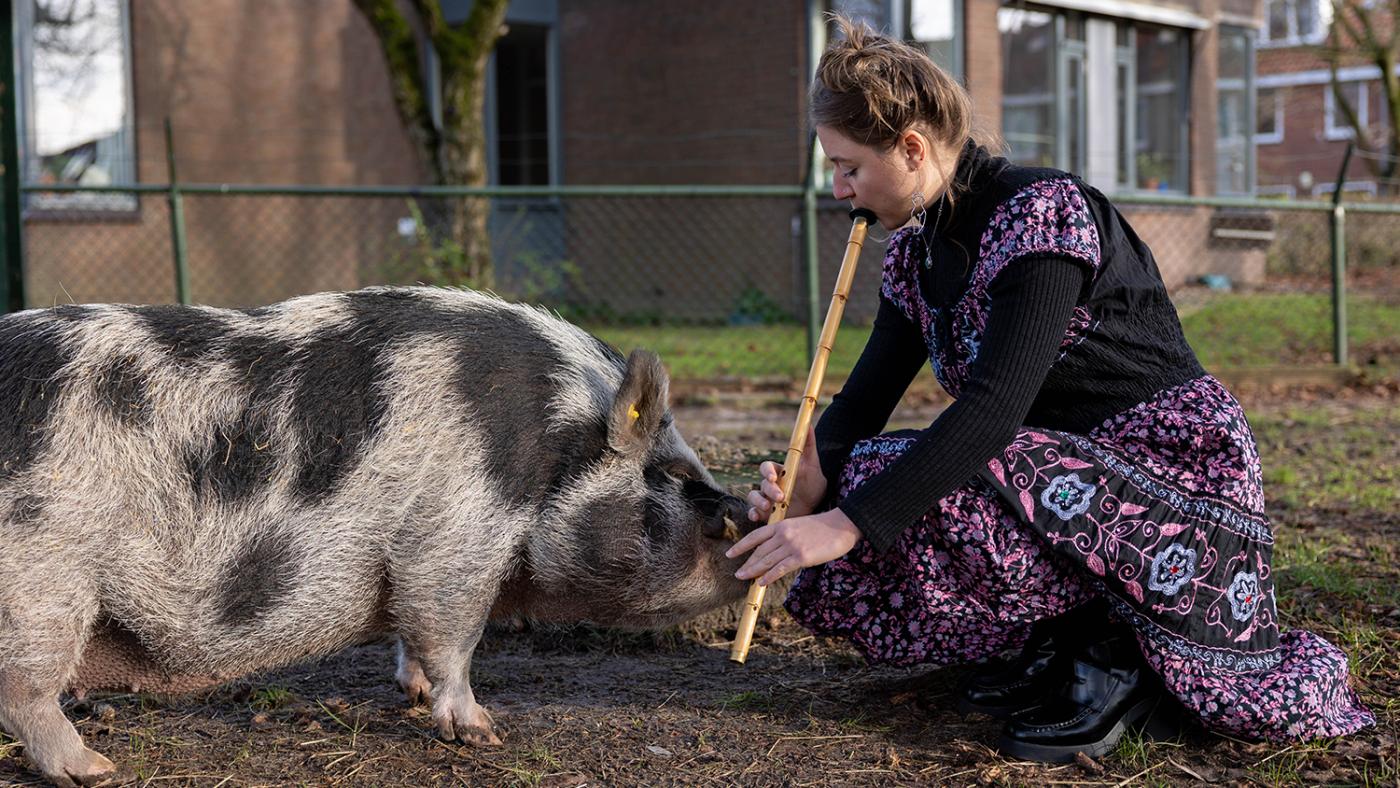
‘The clash of worldviews often makes me sad’
"My mother is Turkish and I’d been to Turkey several times, which is why I was so thrilled to have the opportunity to attend Bogazici University in 2022, on an Erasmus scholarship. In Turkey, Bogazici is known as a prestigious university with strict admission requirements. It’s also the university where my grandmother used to study.
For an entire year, I attended classes, made friends, learned the language and became closer to my family. I felt like I was building some momentum and, before I knew it, the exchange was over. I didn't want it to end, so I decided to stay a bit longer. I started working at a restaurant, making music, and hanging out with my new friends a lot.
In early 2023, we were shocked by the earthquake in Turkey. Although Istanbul was not hit, this news had a huge impact on us. Everyone was glued to the television or following social media. People from the afflicted area shared images of their broken homes or of family members still trapped under the rubble. It was like a stream of misery passing by.
I wanted to do something. First, I went to the town hall to assist in sending relief goods. I was often asked if I could try to get contributions from the Netherlands. Being from the Netherlands, people have certain expectations about your ability to do something. I got in touch with my student association, Atlas, and we organised a lecture in Utrecht during which the honorary consul of the Dutch embassy in Turkey spoke.
Thanks to that event, we managed to raise several hundred euros. I was happy that they wanted to do this with me. My suggestion was to give the money to a Turkish theatre group that was performing Jip & Jannekke (characters from a series of Dutch children's books, Ed.) for children in the affected areas. They also handed out children's books. Most of all, I wanted to buy books with that money."
In the end, we were never able to transfer the money. Students in the Netherlands wanted to see invoices and proof of how the money would be spent. But that's not how things work in Turkey. Ultimately, it’s a clash of worldviews, something I encounter often. I understand both sides, but it also makes me sad. In the end, the money was donated to the Red Cross.
I also travelled to the affected area for a few days to help with a project in Antakya. A friend of mine, who is a professional clown, was helping children with grief counselling while researching emotional counselling during a disaster of this magnitude. Antakya is a special area where Sunnis, Alevis and Turkish/Arab Christians live together in harmony. The question is, unfortunately, whether harmony will remain after such a disaster.
I’ve since returned to the Netherlands to pursue another Master's degree in Utrecht, this time in Arts & Society. My time in Turkey has been very educational. I attended all classes but did not take a single exam. I was just there."
Studying or taking a gap year?
"Studying. It's just a pity that sometimes you need a gap year because you are completely burnt out after a year of studying."
Baklava or pepernoten?
“That’s a hard one. Pepernoten are so much fun! The Piets just toss them onto the streets and parents don't mind if children pick them up from the ground. But I prefer eating baklava."
Wilders or Erdogan?
"Wilders is a big fan of Atatürk, the founder of modern-day Turkey, who fought against Islam. Because of this obsession with Turkey, Wilders is known and appreciated by certain circles there. Erdogan is worse, in my view. He has power and has locked up friends of mine. Wilders hasn't had that chance yet."